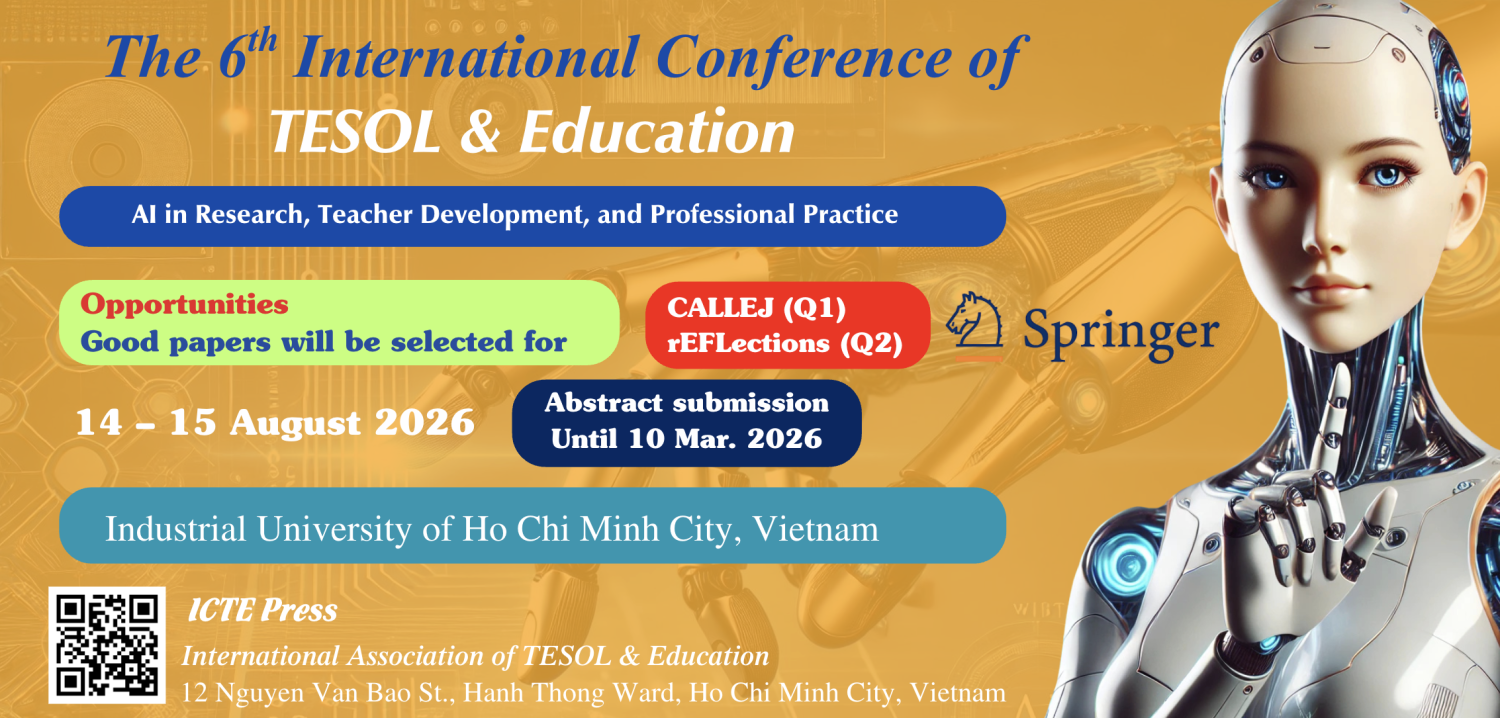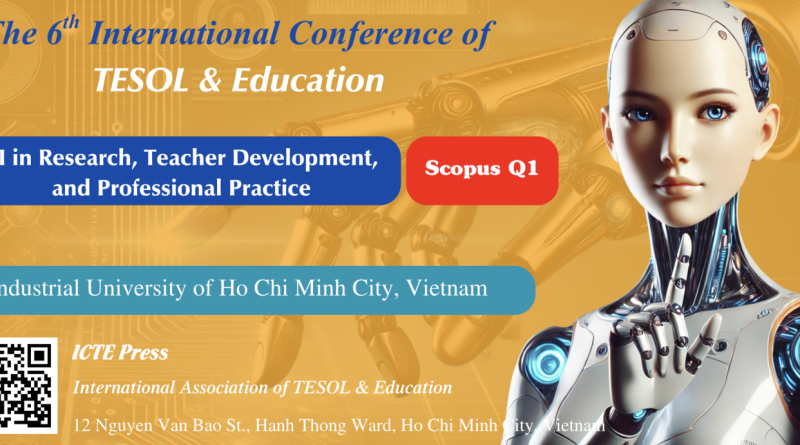The 6th International Conference of TESOL & Education
Dear beloved TESOLers & Educators,
 The 5th International Conference of TESOL & Education (ICTE 2025), hosted at Hanoi University of Industry, Hanoi, Vietnam, was a resounding success. Thanks to the invaluable contributions of our distinguished keynote speakers, featured talks, and over 200 authors and presenters from 26 different countries, ICTE 2025 became a truly global forum for exchanging cutting-edge ideas in TESOL and education. This momentum now carries us forward into ICTE 2026, promising an even more impactful and inspiring event.
The 5th International Conference of TESOL & Education (ICTE 2025), hosted at Hanoi University of Industry, Hanoi, Vietnam, was a resounding success. Thanks to the invaluable contributions of our distinguished keynote speakers, featured talks, and over 200 authors and presenters from 26 different countries, ICTE 2025 became a truly global forum for exchanging cutting-edge ideas in TESOL and education. This momentum now carries us forward into ICTE 2026, promising an even more impactful and inspiring event.
The 6th International Conference of TESOL & Education (ICTE 2026) takes a forward-looking approach by centering on the transformative power of Artificial Intelligence (AI) in reshaping the entire landscape of language education. As AI continues to advance at an unprecedented pace, its influence extends far beyond simple classroom applications, impacting how teachers design curricula, how learners engage with language, and how researchers investigate complex educational phenomena. This year’s theme, AI in Research, Teacher Development, and Professional Practice, underscores the urgent need to critically examine and harness AI-driven innovations that are redefining classroom practices, professional identity, and the future of TESOL. From intelligent tutoring systems and automated assessment tools to AI-assisted writing support, speech recognition, and immersive virtual learning environments, ICTE 2026 invites educators, researchers, and policymakers to explore both the opportunities and challenges of AI integration. The conference aims not only to highlight cutting-edge research but also to foster meaningful dialogue on ethical considerations, academic integrity, and the sustainable adoption of AI in language education worldwide.
🎯 Theme: AI in Research, Teacher Development, and Professional Practice
📍 Venue: Industrial University of Ho Chi Minh City, Vietnam
📅 Tentative Dates: 14 – 15 August 2026
🏛️ Address: 12 Nguyen Van Bao, Hanh Thong Ward, Ho Chi Minh City, Vietnam
🎯 Aims and Scope
The 6th International Conference of TESOL & Education (ICTE 2026) aims to provide a global platform for scholars, educators, and practitioners to engage in critical discussions and knowledge exchange on the integration of Artificial Intelligence (AI) in language education. Building on the legacy of previous ICTE conferences, this event seeks to:
- Advance Research Excellence: Showcase innovative studies that investigate how AI technologies are transforming language learning, teaching methodologies, and teacher development.
- Foster Professional Development: Equip teachers and educators with practical strategies, digital tools, and pedagogical insights to effectively integrate AI into classroom practice.
- Encourage Multidisciplinary Perspectives: Bridge the fields of TESOL, applied linguistics, educational technology, and cognitive science to examine AI’s impact from multiple dimensions.
- Promote Ethical and Sustainable AI Use: Address pressing issues related to academic integrity, data privacy, and responsible implementation of AI in education.
- Strengthen Global Collaboration: Provide opportunities for networking and partnership-building among researchers, policymakers, and institutions worldwide.
Scope
The scope of ICTE 2026 spans across a wide range of topics in TESOL and education, with particular emphasis on:
- AI-powered tools for language learning and assessment
- Ethical dimensions in the digital age
- Artificial intelligence as an innovative tool for language teaching activities
- The impacts of AI in language research
- Teacher training, professional identity, and career development in the AI era
- Task-Based Language Teaching (TBLT) and technology-enhanced practices
- Gamification, immersive learning, and Virtual/Augmented Reality for language education
- Online and blended learning models supported by AI
- Mobile-Assisted Language Learning (MALL)
- Global perspectives on English-Medium Instruction (EMI) and AI integration
- Research methodologies and academic writing supported by AI tools
- Language & Linguistics
- Translation and Interpretation
- Applied Linguistics
- Comparative linguistics
- Culture and communication
- Language & Literature
The ICTE 2026 aspires to shape the future of language education in the age of AI, ensuring it remains inclusive, ethical, and impactful across contexts by bringing together diverse voices and perspectives.
🔑 Why Present at ICTE 2026?
- Cutting-Edge AI Research
Discover the latest developments in AI-assisted teaching and learning, including intelligent tutoring systems, adaptive assessment, generative AI for writing, and immersive technologies. - Scopus Q1 Publication Opportunities
High-quality papers will be considered for publication in the Special Issue of CALL-EJ (Scopus Q1), as well as ICTE Proceedings and affiliated journals (IJTE, IJLI, IJAILE). - Global Networking
Connect with educators, researchers, and practitioners from around the world, building collaborative partnerships that extend beyond the conference. - Practical Teacher Insights
Engage with hands-on workshops and classroom-focused discussions on AI in speaking, writing, listening, and assessment.
📌 Conference Highlights
- Keynote Speeches by world-leading experts in TESOL, AI, and educational innovation.
- Workshops on AI-assisted teaching tools, professional development, and digital pedagogy.
- Paper Presentations exploring best practices, action research, and global trends in language education.
- Panel Discussions addressing ethics, academic integrity, and the responsible integration of AI in education.
📖 Publication Opportunities
ICTE 2026 offers several avenues for publishing your research:
International Journal of TESOL & Education Education (IJTE):
- Submission: If you choose to publish your article in the IJTE, please submit your paper to https://i-jtorg. The publication fee is 40usd/paper for the conference presenters.
- Note: Don’t forget to use the journal’s template and forms for your submission. The forms can be downloaded from the Journal Guides for authors.
International Journal of Language Instruction (IJLI):
- Submission: To publish your article in the IJLI, please submit your paper to https://i-jli.org. The publication fee is 40usd/paper for the conference presenters.
- Note: Ensure that you adhere to the proceedings submission guidelines and use the provided template.
ICTE Conference proceedings (ICTEP):
- Submission: To publish your article in the ICTEP, please submit your paper to https://i-cte.org/proceedings. The publication fee is 40usd/paper for the conference presenters.
- Note: Ensure that you adhere to the proceedings submission guidelines and use the provided template.
Special Issue in the Computer-Assisted Language Learning Electronic Journal (Scopus Q1):
- Opportunity: ICTE2026 will feature a Special Issue in the Computer-Assisted Language Learning Electronic Journal(CALL-EJ), a Scopus-Q1
- APC: A separate publishing fee of 189 USD per paper is required in case the paper is accepted for publication. All reviewing processes for free of charge.
- Submission Process: Please email your manuscript to conference.icte@gmail.com after the conference took place for an initial check. If your work has the potential to be considered for publication in the Special Issue of CALL-EJ, we will provide you with detailed instructions on how to submit it to the journal.
- Good papers will be selected for publication as book chapters by Springer Nature (Scopus-indexed).
Notes: The Publication Fees are separate from the Conference fees, and the paper is only charged when the paper is accepted for publication after double-blind peer reviews. Don’t include any publication fee in the conference fee.
Don’t forget to use the respective journal’s template for your submissions.
Important Dates 🎟️
- Call for Papers Announcement: 1st October, 2025
- Abstract Submission: 25 October, 2025
- Notification of Acceptance: 15 December 2025 – 22 February 2026
- Early Bird Registration: 15 March – 30 April, 2026
- Full Paper Submission: 15 May, 2026
- Conference Registration: June 30, 2026
- PowerPoint Submission: August 05, 2026
- Conference Dates: 14 – 15 August 2026
📢 Presentation Modes:
The Conference will be hybrid – Virtual or offline for delegates outside VN and offline-only for local delegates.
Please mark your calendars for August 2026, and join us at the forefront of language education’s future!
Together, let’s explore the endless possibilities that AI brings to language teaching and learning.
🚀 Join Us at ICTE 2026
Be part of the next wave of innovation in TESOL and education. Present your research, share your teaching practices, and join a global community committed to exploring the future of AI-powered language learning.
👉 For details, submission guidelines, and registration, visit: https://i-cte.org
Contact Information 📞
For inquiries, please contact:
-
Email: conference.icte@gmail.com
-
Phone/WhatsApp: +84 909850699
-
Conference Website: https://i-cte.org
Keynote Speakers
Presidential Keynote
Professor Dr. Andrew Lian, Suranaree University of Technology, Thailand; Professor Emeritus, University of Canberra, Australia
 Professor Dr. Andrew Lian is Professor of Foreign Language Studies, School of Foreign Languages, Suranaree University of Technology, Thailand, He specializes in the methodology of teaching foreign/second languages and has had a special interest in the uses of modern technology to enhance learning since the late 1970s. He is one of the pioneers of Technology-Enhanced Language-Learning in Australia. Previous to this appointment, he was Professor and Chair of the Department of Foreign Languages and Literatures at Western Illinois University in the United States. Prior to that, he had been Professor of Humanities and Director of the Center for the Study of Languages at Rice University, Houston, TX, USA, and Professor and Head of the School of Languages and International Education at the University of Canberra in Australia. He has held further Professorial appointments and been Head of Department in two other universities in Australia (James Cook University and Bond University). His current research interests are in the area of self-adjusting and self-organizing (language/culture-) learning environments based on rhizomatic approaches to (language/culture-) learning and the generation of personal learning environments within a 21st-century perspective. As a consequence, he is also interested in the development and use of multimedia databases in (language/culture)-teaching and learning. More details can be found at http://andrewlian.com/new and http://andrewlian.com. He can be reached at President at asiacall.info (Orcid) (Scopus)
Professor Dr. Andrew Lian is Professor of Foreign Language Studies, School of Foreign Languages, Suranaree University of Technology, Thailand, He specializes in the methodology of teaching foreign/second languages and has had a special interest in the uses of modern technology to enhance learning since the late 1970s. He is one of the pioneers of Technology-Enhanced Language-Learning in Australia. Previous to this appointment, he was Professor and Chair of the Department of Foreign Languages and Literatures at Western Illinois University in the United States. Prior to that, he had been Professor of Humanities and Director of the Center for the Study of Languages at Rice University, Houston, TX, USA, and Professor and Head of the School of Languages and International Education at the University of Canberra in Australia. He has held further Professorial appointments and been Head of Department in two other universities in Australia (James Cook University and Bond University). His current research interests are in the area of self-adjusting and self-organizing (language/culture-) learning environments based on rhizomatic approaches to (language/culture-) learning and the generation of personal learning environments within a 21st-century perspective. As a consequence, he is also interested in the development and use of multimedia databases in (language/culture)-teaching and learning. More details can be found at http://andrewlian.com/new and http://andrewlian.com. He can be reached at President at asiacall.info (Orcid) (Scopus)
Presentation title: coming soon
Keynote 1
Associate Professor Dr Pham Vu Phi Ho, Faculty of Foreign Languages, Industrial University of Ho Chi Minh City, Vietnam
 Assoc. Prof. Pham Vu Phi Ho, Ph.D., Faculty of Foreign Languages, Industrial University of Ho Chi Minh City, Vietnam, used to be a Vice-President of Ba Ria – Vung Tau University and Vice-President at Van Hien University, Vietnam. Pham has published more than 70 research articles in both local and International Journals, such as Computer-Assisted language Learning, SAGE Open, System, and Journal of Psycholinguist Research (20 Scopus/14 ISI), and 10 books and course-books, 3 Edited Books (Springer and IGI Global), of which 3-course books were used for both the undergraduate and graduate levels at Van Lang University, HCMC Open University, Vietnam, and Lourdes College, Higher Education Department, Cagayan de Oro City, Philippines. He has international experience in teaching English at Suranaree University of Technology, Thailand, and Gyeongju University, South Korea. He is the Vice President for Administrative Affairs of AsiaCALL. He is now the Editor-in-Chief of the International Journal of TESOL & Education. He is the editor-in-chief for several proceedings published by Atlantis Press, part of Springer. He is a managing editor of CALL-EJ (Scopus Q1), an editorial staff for the Suranaree Journal of Social Science (Scopus Q3), and a peer reviewer for some international Journals indexed in ISI/Scopus such as Computer Assisted Language Learning, Open Sage… (Scopus), (ISI), (Google Scholar).
Assoc. Prof. Pham Vu Phi Ho, Ph.D., Faculty of Foreign Languages, Industrial University of Ho Chi Minh City, Vietnam, used to be a Vice-President of Ba Ria – Vung Tau University and Vice-President at Van Hien University, Vietnam. Pham has published more than 70 research articles in both local and International Journals, such as Computer-Assisted language Learning, SAGE Open, System, and Journal of Psycholinguist Research (20 Scopus/14 ISI), and 10 books and course-books, 3 Edited Books (Springer and IGI Global), of which 3-course books were used for both the undergraduate and graduate levels at Van Lang University, HCMC Open University, Vietnam, and Lourdes College, Higher Education Department, Cagayan de Oro City, Philippines. He has international experience in teaching English at Suranaree University of Technology, Thailand, and Gyeongju University, South Korea. He is the Vice President for Administrative Affairs of AsiaCALL. He is now the Editor-in-Chief of the International Journal of TESOL & Education. He is the editor-in-chief for several proceedings published by Atlantis Press, part of Springer. He is a managing editor of CALL-EJ (Scopus Q1), an editorial staff for the Suranaree Journal of Social Science (Scopus Q3), and a peer reviewer for some international Journals indexed in ISI/Scopus such as Computer Assisted Language Learning, Open Sage… (Scopus), (ISI), (Google Scholar).Keynote 2
Professor Dr. Jeremy White, Ritsumeikan University, Japan
 Professor Dr. Jeremy White is a professor in the College of Information Science and Engineering at Ritsumeikan University, Japan. He has taught English as a Foreign Language (EFL) in Japan for the past 20 years. He earned his PhD from Kyoto University; his dissertation research was related to Minecraft and task-based learning to encourage English language communication. Professor Dr. Jeremy White is the editor-in-chief of the CALL-EJ (Computer-Assisted Language Learning Electronic Journal) (Scopus-Q1). Professor Dr. Jeremy White is also the co-editor-in-chief of the International Journal of AI in Language Education (IJAILE) published by the ICTE Press (Scopus ID), (Google Scholar)
Professor Dr. Jeremy White is a professor in the College of Information Science and Engineering at Ritsumeikan University, Japan. He has taught English as a Foreign Language (EFL) in Japan for the past 20 years. He earned his PhD from Kyoto University; his dissertation research was related to Minecraft and task-based learning to encourage English language communication. Professor Dr. Jeremy White is the editor-in-chief of the CALL-EJ (Computer-Assisted Language Learning Electronic Journal) (Scopus-Q1). Professor Dr. Jeremy White is also the co-editor-in-chief of the International Journal of AI in Language Education (IJAILE) published by the ICTE Press (Scopus ID), (Google Scholar)
Keynote 3
Dr. Ania Lian, Charles Darwin University, Australia
 Dr. Ania Lian, Senior Lecturer (eq. Associate Professor) in Education (Teaching and Learning), Charles Darwin University, Australia, Vice-President for Research & Innovation and Chief Editor of the AsiaCALL Online Journal. Since 1993, Ania has held positions at various universities in Australia, with her work focusing on the uses of technology in second language learning and in education in general, including software development. She has also worked at the National Policy Office of the Council on the Ageing in Canberra and has a history of working on a voluntary basis with the wider community on sustainability projects within the framework of the Queanbeyan Business Council, NSW. Ania has been a keynote speaker at a number of academic conferences both in Australia and in Asia, where she engages in building collaborative networks between CDU and other universities, with the aim of expanding the international focus of all involved. The leading objective of her teaching and research is to explore the concept of inclusive learning environments, with a specific focus on learner-centredness. Her recent interest in graduate attributes developed from these concerns which form the framework of her approach. Her professional portfolio can be found by clicking HERE. As Vice-President, AsiaCALL (Research and Innovation) Ania has created the AsiaCALL Professional Learning Community (https://sites.google.com/site/asiacallplc/) and, on Facebook, The AsiaCALL Phd and Research. Orcid ID; Scopus ID
Dr. Ania Lian, Senior Lecturer (eq. Associate Professor) in Education (Teaching and Learning), Charles Darwin University, Australia, Vice-President for Research & Innovation and Chief Editor of the AsiaCALL Online Journal. Since 1993, Ania has held positions at various universities in Australia, with her work focusing on the uses of technology in second language learning and in education in general, including software development. She has also worked at the National Policy Office of the Council on the Ageing in Canberra and has a history of working on a voluntary basis with the wider community on sustainability projects within the framework of the Queanbeyan Business Council, NSW. Ania has been a keynote speaker at a number of academic conferences both in Australia and in Asia, where she engages in building collaborative networks between CDU and other universities, with the aim of expanding the international focus of all involved. The leading objective of her teaching and research is to explore the concept of inclusive learning environments, with a specific focus on learner-centredness. Her recent interest in graduate attributes developed from these concerns which form the framework of her approach. Her professional portfolio can be found by clicking HERE. As Vice-President, AsiaCALL (Research and Innovation) Ania has created the AsiaCALL Professional Learning Community (https://sites.google.com/site/asiacallplc/) and, on Facebook, The AsiaCALL Phd and Research. Orcid ID; Scopus ID
Presentation title: Comining soon
And more…

